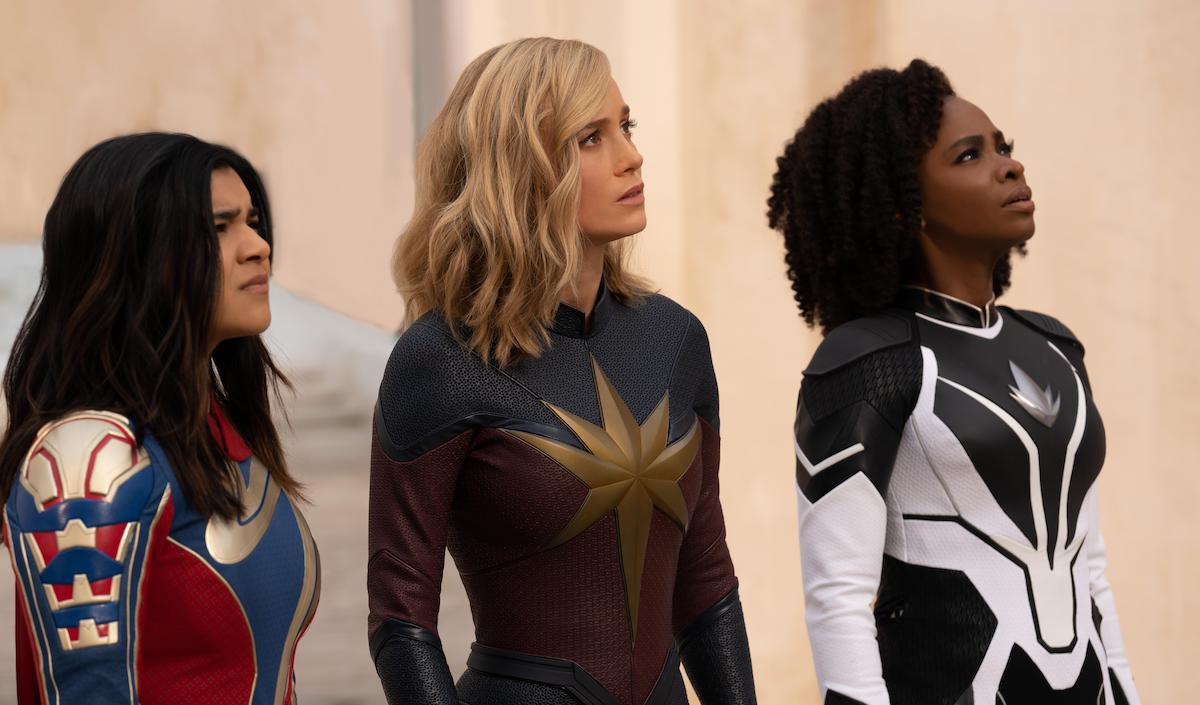Look, it sucks. For all the degree to which I’ve maintained — since Iron Man! — that the MCU films are intended, and absorbed on my end, as entertaining Saturday-morning confections, it still bums me out to watch the whole thing fall apart in front of me, because I loved this thing. Part of my reaction is purely, spitefully hating to see the Film Xitter losers get to feel like they got it right (if they had got it right, the MCU would have collapsed sometime between Iron Man 3 and Thor: The Dark World); and part of it is, yeah, the undeniable reality that since about Multiverse of Madness eighteen months ago, the batting average on these things has suuuuuuuuucked. There have been four films (five if you count The Marvels, which I have not seen as of this writing) and three television series since the lacklustre Doctor Strange sequel, and of those eight total, one of them was good, three were good-but-shaky, and two of them are the two worst things Marvel has ever done. Wow.
Variety’s article doesn’t do much more than put the logical pieces together across a year’s worth of industry stories and then narrativize them, much as I did in July; but its cover-story status certainly signals the beginning of a new phase (pun intended) in the mainstream media’s Marvel Narrative: welcome to Avengers Disassembled. This is fine, this is normal, this is what mainstream media has to do (entertainment journalism narratives, particularly): plotting a downturn to keep the story fresh, so that it can subsequently plot a comeback narrative when things stabilize again. I get it. I do.
But it still sucks. I recently toured back through the 2021 MCU offerings, mostly because back in the “it was supposed to be post-pandemic but actually turned out to be mid-pandemic” age, Marvel blurted out so much material so quickly (five television series and four feature films between January and December of that year) that it became difficult to appreciate each of them on its own merits in turn. (I don’t believe “superhero fatigue” ever existed; or at least, not before Marvel evidently saw the premise trending in various think pieces, said “hold my beer,” and decided to release two years’ worth of productions in eleven months. In other words, in the 48 weeks between the debut of WandaVision and the release of No Way Home, there was a new Marvel thing to watch — either a movie or an episode of television — in 41 of them.)
2021 was such a strong creative start to Phase Four, though, that I’m amazed by the cultural amnesia around it. Sure, most people didn’t like Eternals (myself excepted), but that year still felt like the kind of year where the studio was swinging for things that had the potential to yield incredible storytelling if they succeeded. WandaVision and Loki and Spider-Man: No Way Home stand as the year’s (and the phase’s) highlights for their IP-fuelled whimsy, but even the programs and movies that lurked in their shadows made staunch cases for themselves in 2021 — all of which has been forgotten under the big-tent “phase four bad, Marvel bad” narrative.
Hawkeye, a series I couldn’t have given less of a fuck about at the time, turns out to be a capable Christmas charmer that has wormed its way onto my seasonal watchlist. What If?, a series I arguably cared less about than Hawkeye, might stand in perpetuity as the franchise’s best take on multiverse storytelling, if future movies and shows don’t get their shit together. Black Widow’s supporting cast is so endlessly charming (Yelena particularly) that, if anything, I’m merely miffed that there’s been such a glut of material since the film was released that we’ve barely seen any of them resurface. (Yelena popped back up in Hawkeye, delightfully so; and she and Alexei will theoretically recur in Thunderbolts.) And yeah, Falcon and the Winter Soldier’s a mess, narratively; but it looked better, moved faster, and had more crowd-pleasing narrative hooks in single episodes than Secret Invasion managed across its entire run. We’ve fallen a long way in two years.
I’ve recently finished the “MCU book,” a brick-like tome called MCU: The Rise of Marvel Studios, which handily lays out the backstory of the development of phases one through four. I kind of wish the book had stopped at phase three, actually; like Binge Times last year, this is a great entertainment journalism treatise that feels like it only gets to step its toe into a major development within the story — phase four troubles for MCU, the streaming collapse for Binge Times — when that toe-dip would qualify to be the core of an entire second book, had the timing worked out differently.
And, bruised feelings aside, the “what happened?” of the MCU downturn is exactly my shit. To cite a parallel example, once you get over how bad The Rise of Skywalker was — which, I assure you, I finally did — the fascination becomes entirely around the circumstances of its construction… not out of vindictiveness, but a genuine, I-care-about-this-shit curiosity about how a machine purpose-built to build delights for its audience punches out something so wrong.
The actual truth is that filmmaking, which I’ll address in lieu of all other collaborative enterprises, is a finicky, unpredictable mistress, where even having all of the right ingredients and most of the right resources doesn’t guarantee the right outcome. It only seems baffling in the MCU’s case because they had the process on lock for so long; and that rather than declining gradually as might have been expected, they seem to have gone off a cliff roughly eighteen months ago. There’s a huge story waiting to be written (maybe after phase six?) about how this all went down, and I can’t wait to read it.
